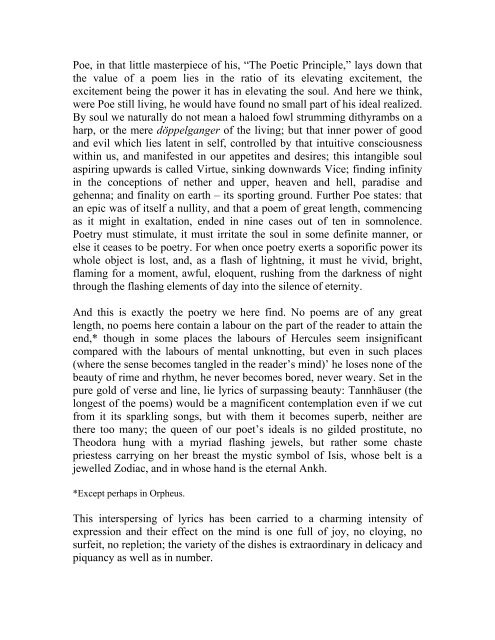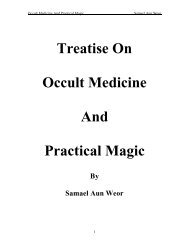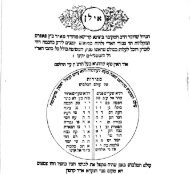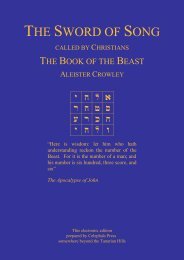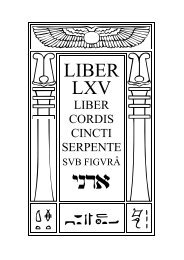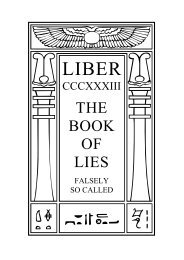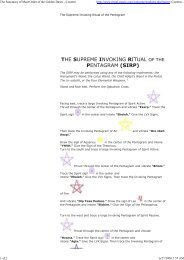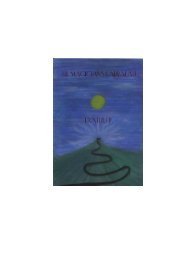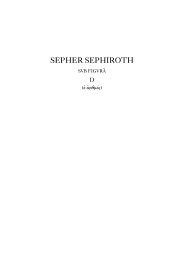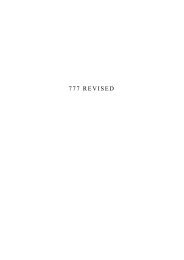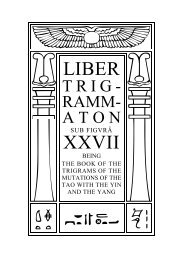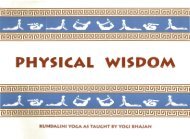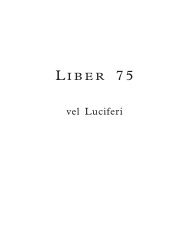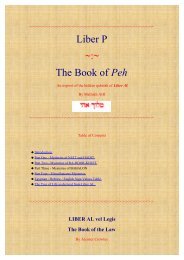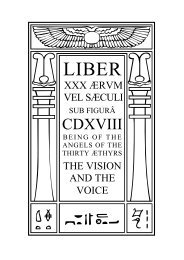Star In the West TNR.pdf - The Hermetic Library
Star In the West TNR.pdf - The Hermetic Library
Star In the West TNR.pdf - The Hermetic Library
You also want an ePaper? Increase the reach of your titles
YUMPU automatically turns print PDFs into web optimized ePapers that Google loves.
Poe, in that little masterpiece of his, “<strong>The</strong> Poetic Principle,” lays down that<br />
<strong>the</strong> value of a poem lies in <strong>the</strong> ratio of its elevating excitement, <strong>the</strong><br />
excitement being <strong>the</strong> power it has in elevating <strong>the</strong> soul. And here we think,<br />
were Poe still living, he would have found no small part of his ideal realized.<br />
By soul we naturally do not mean a haloed fowl strumming dithyrambs on a<br />
harp, or <strong>the</strong> mere döppelganger of <strong>the</strong> living; but that inner power of good<br />
and evil which lies latent in self, controlled by that intuitive consciousness<br />
within us, and manifested in our appetites and desires; this intangible soul<br />
aspiring upwards is called Virtue, sinking downwards Vice; finding infinity<br />
in <strong>the</strong> conceptions of ne<strong>the</strong>r and upper, heaven and hell, paradise and<br />
gehenna; and finality on earth – its sporting ground. Fur<strong>the</strong>r Poe states: that<br />
an epic was of itself a nullity, and that a poem of great length, commencing<br />
as it might in exaltation, ended in nine cases out of ten in somnolence.<br />
Poetry must stimulate, it must irritate <strong>the</strong> soul in some definite manner, or<br />
else it ceases to be poetry. For when once poetry exerts a soporific power its<br />
whole object is lost, and, as a flash of lightning, it must he vivid, bright,<br />
flaming for a moment, awful, eloquent, rushing from <strong>the</strong> darkness of night<br />
through <strong>the</strong> flashing elements of day into <strong>the</strong> silence of eternity.<br />
And this is exactly <strong>the</strong> poetry we here find. No poems are of any great<br />
length, no poems here contain a labour on <strong>the</strong> part of <strong>the</strong> reader to attain <strong>the</strong><br />
end,* though in some places <strong>the</strong> labours of Hercules seem insignificant<br />
compared with <strong>the</strong> labours of mental unknotting, but even in such places<br />
(where <strong>the</strong> sense becomes tangled in <strong>the</strong> reader’s mind)’ he loses none of <strong>the</strong><br />
beauty of rime and rhythm, he never becomes bored, never weary. Set in <strong>the</strong><br />
pure gold of verse and line, lie lyrics of surpassing beauty: Tannhäuser (<strong>the</strong><br />
longest of <strong>the</strong> poems) would be a magnificent contemplation even if we cut<br />
from it its sparkling songs, but with <strong>the</strong>m it becomes superb, nei<strong>the</strong>r are<br />
<strong>the</strong>re too many; <strong>the</strong> queen of our poet’s ideals is no gilded prostitute, no<br />
<strong>The</strong>odora hung with a myriad flashing jewels, but ra<strong>the</strong>r some chaste<br />
priestess carrying on her breast <strong>the</strong> mystic symbol of Isis, whose belt is a<br />
jewelled Zodiac, and in whose hand is <strong>the</strong> eternal Ankh.<br />
*Except perhaps in Orpheus.<br />
This interspersing of lyrics has been carried to a charming intensity of<br />
expression and <strong>the</strong>ir effect on <strong>the</strong> mind is one full of joy, no cloying, no<br />
surfeit, no repletion; <strong>the</strong> variety of <strong>the</strong> dishes is extraordinary in delicacy and<br />
piquancy as well as in number.


